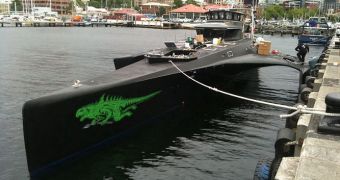Captain Locky MacLean of the MV Gojira – one of the three vessels the Sea Shepherd Conservation Society (SSCS) operates in the Southern Ocean – narrowly steered his boat and crew to safety today, after a Japanese whaling ship turned on him, bow first.
The Yushin Maru No. 3, one of the three harpoon ships of the Japanese fleet that is whaling in the protect Southern Ocean Whale Sanctuary illegally, was running on a parallel course to the Gojira.
At one point, it broke hard turn to part, with the clear intention of ramming the SSCS vessel, and splitting it in half. This would not be the first time this happens. Sea Shepherd lost another ship last year in the exact same manner.
But Captain MacLean was quick on the helm, and steered the incredibly-fast Gojira too. The two ships passed within 10 feet of each other, while the Japanese whalers threw potentially-deadly bamboo spears at the crew of the multi hulled vessel.
“It was like staring death in the face when that steel hull suddenly turned into us. We just narrowly avoided being cut in half,” the SSCS Captain explains.
At the time of the incident, the Gojira and fast inflatable boats from the SSCS vessel the Bob Barker were running interference with the Japanese harpoon vessel, which has been tailing the Bob Barker for days, preventing it from looking after the rest of the Japanese whaling fleet.
The SSCS crew were using stink and paint bombs to deter the Yushin Maru No. 3 from its course, which they managed to do in the end. The Bob Barker is now free to pursue the Nisshin Maru 2 factory ship through the ices of the Antarctic.
“With the Bob Barker escaping their grasp, the Yushin Maru No. 3 issued an international distress signal saying they were under attack by Sea Shepherd ships the Bob Barker and the Gojira,” a SSCS press release reads.
But this was impossible, since the Bob Barker had already traveled more than seven miles by the tinme the Japanese whalers issued their distress signal.
“Both the Bob Barker and the Gojira acknowledged the distress signal and radioed the Yushin Maru No. 3 to inquire as to the nature of their distress. They were radioed three times in Japanese and in English, but refused to reply,” the SSCS statement says.
Regardless of Sea Shepherd members' good-intended actions, “the Institute for Cetacean Research issued a media release accusing Sea Shepherd of not offering assistance when in fact assistance was offered three times,” the organization says.
“The Gojira radioed the Yushin Maru No. 3 stating that they would not be hassled if they stopped trailing the Bob Barker. Sea Shepherd views the tailing of their ships as provocation,” the document concludes.

 14 DAY TRIAL //
14 DAY TRIAL //